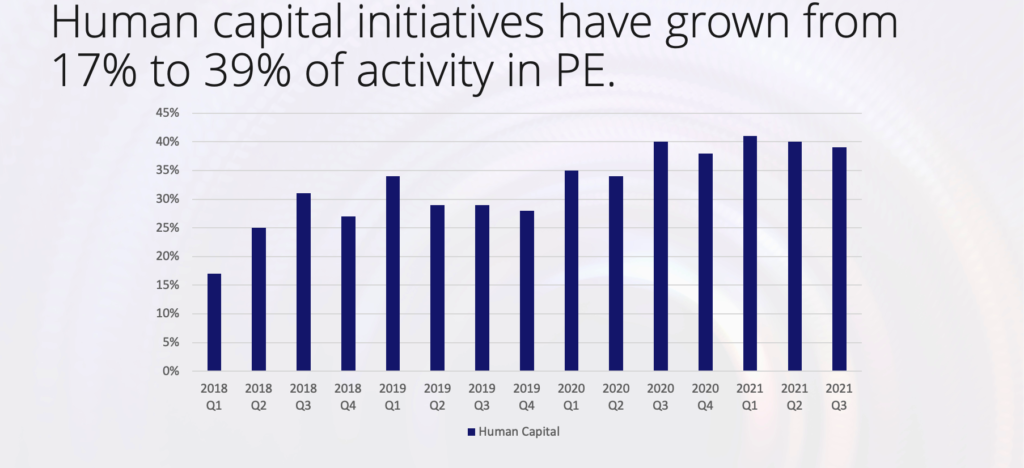In private equity, the CFO role is a pressure point. The person in that seat determines how quickly a portfolio company can turn plans into measurable results. A strong CFO builds systems that produce accurate data, uses that data to make sound decisions, and keeps both the CEO and investors aligned on what’s next.
When that seat turns over, the impact is immediate. Most CFOs in PE-backed companies leave by 18 months. A search for a permanent replacement can take months, leaving the business without the financial leadership it needs during a critical stretch of the investment cycle. In that time, reporting lags, lender relationships can weaken, and strategic initiatives lose momentum.
An interim CFO changes that trajectory. The right one keeps the company moving at full speed. They step in with a clear mandate, take ownership from day one, and focus on solving the exact problems that threaten value. In many cases, the gains they protect or create outweigh the total cost of their engagement.
The CFO Role in Private Equity – Epicenter of Value and Vulnerability
In a PE-backed business, the CFO is pulled into every major decision. They have to keep the numbers clean while also shaping the path forward. Investors expect clear reporting, but they also expect insights that show exactly how the company will hit its growth targets.
The job leans heavily on commercial judgment. A PE-grade CFO knows how to manage cash in a leveraged structure, keep covenants in the safe zone, and move capital where it will do the most good. They can read the signals in the data and push the team toward actions that actually change the outcome.
There aren’t many people who can work at that level under PE timelines. Expectations are high, and pressure is too. In most firms, more than eight out of ten CFOs are gone before the investment wraps up. When that happens, the financial engine of the business stalls while the search for a replacement drags on. The portfolio company keeps moving — but it comes at a cost.
The Cost of CFO Turnover and Vacancies
CFO turnover in private equity is far higher than in public companies. In fact, CFOs in private equity that stay longer than 18 months have an average tenure of 20% less than their listed counterparts. That short tenure means leadership changes happen mid-hold, right when sponsors are trying to execute their growth plan.
Replacing a CFO takes time. A search taking half a year isn’t uncommon. In a five-year hold period, that gap is significant — especially when it’s followed by the new hire’s ramp-up period.
The vacancy not only slows things down, but it creates measurable risk:
- Reporting lags that frustrate boards and delay decisions.
- Weaker lender relationships when financial updates lose consistency.
- Strategic drift as initiatives stall without a financial leader to drive them.
- Missed performance targets that are hard to recover before exit.
The financial impact can be severe. In private equity, the CFO is critical to delivering the investment thesis. A mismanaged handoff can put the entire value creation plan at risk.
Interim CFOs Maximum ROI – How they Deliver
An interim CFO isn’t just there to “hold down the fort.” The best are matched to the exact challenge the business is facing. In private equity, that can mean very different things depending on timing, performance, and upcoming events. Here’s where the return on an interim engagement is most obvious:
1. Sudden vacancy
A CFO leaves without warning and the chain of command snaps. Financial reports stall, then lenders start calling with questions. The right interim can be in the chair within days, re-establishing control so the business stays operational while the board looks for a long-term fit.
2. Post-acquisition integration
The first stretch after a close is messy. The sponsor wants better reporting. Internal systems need to be aligned. On top of that, legacy processes still run in the background. An interim with integration experience can put the new structure in place while keeping day-to-day work from falling behind.
3. Turnaround and restructuring
When cash is tight, survival comes first. A rolling 13-week forecast gives the visibility to make hard decisions on spend, debt terms, and pricing. An interim with turnaround experience can take those steps quickly, without being caught up in the politics of a permanent role.
4. Pre-exit preparation
Selling or going public pushes the finance function into overdrive. There’s the usual workload, plus diligence requests and data room management. An interim can lead the exit process so the rest of the leadership team can keep hitting operational targets.
5. Hyper-growth scaling
Fast growth exposes systems that weren’t made for it. Forecasting tools start to show their weaknesses, and financial visibility shrinks at the worst possible time. An interim financial leader can build the infrastructure (ERP, FP&A, reporting cadence) that supports growth.
6. Special projects
Some work calls for niche expertise that isn’t needed year-round. A carve-out, SOX compliance, or a complex refinancing can all justify a short-term CFO hire. An interim with the right background steps in, executes, and hands over a finished project.
The common thread in all of these scenarios: the interim CFO is there to solve a specific problem, start delivering value in days, and leave the company in a stronger position than when they arrived.
The True Cost of a Permanent CFO in a PE-Backed Company
Hiring a permanent CFO in a PE-backed company is a big check to write. The salary is just the starting point.
The median salary for a CFO in the U.S. is about $300,000 to $450,000 a year. Add a performance bonus—usually 40% to 100% of base—and you’re quickly pushing the number much higher. And then, there’s equity. In PE, 1% to 1.5% of fully diluted shares is common, which means a meaningful slice of the exit.
There’s additional permanent CFO cost considerations:
- Executive search fees can hit 20%–30% of first-year comp. A $350k salary with a 50% bonus can mean $130k+ to the recruiter before the CFO even starts.
- Benefits and payroll taxes usually tack on another 25%–40% of base pay.
- Onboarding lag is real. It can take three to six months for a new CFO to truly be effective.
- Severance clauses are the wildcard. In an industry with 80% turnover, the odds of paying six to twelve months of salary after a bad hire are not small.
First-year cash cost for a permanent CFO often lands between $615,000 and $922,500 (plus equity dilution). That’s a long-term commitment with a lot of fixed overhead, and if you get it wrong, the cost of unwinding the hire can be brutal.
The Flexible Cost Structure of an Interim CFO
An interim CFO works on a different model. You’re paying for impact over a set period, not locking into years of salary and benefits.
Interim CFO pricing usually falls into one of three buckets:
- Hourly rates for advisory or tightly scoped work: Interim CFO hourly rates in private equity are $250 to $500+ per hour depending on the complexity and urgency.
- Monthly retainers for hands-on leadership: $20,000 to $35,000 for full-time intensity; lower if part-time oversight is all that’s needed.
- Project fees for defined deliverables: ERP rollouts, carve-outs, fundraising prep — negotiated up front.
Cost is tied to the mission. Shorter timelines, narrower scopes, or less urgency mean less spend. When the project’s done or the permanent hire is ready, the cost comes off the books.
There’s so much more flexibility with an interim executive. If the fit isn’t right, you can pivot without paying severance or watching the wrong person sit in a key seat for months. And when it is right, the work done in that limited window can add millions in value before the next phase begins.
Interim CFO vs Permanent CFO – Beyond Cost Comparison
The best way to judge an interim CFO is by looking at the results they leave behind. In private equity, that’s both the value they create and the risks they prevent.
Qualitative ROI
- Speed – An interim can be in the role in days, not months. That keeps reporting on track and strategic projects moving while the investment clock keeps ticking.
- Objectivity – They arrive without a political history in the company, which makes it easier to make hard calls.
- Risk mitigation – Strong interim leadership reassures lenders, investors, and the board when things are in flux.
- De-risking the permanent hire – They can clean up the finance function so the next full-time CFO steps into a stable, well-run operation.
Quantitative ROI
- Cost savings – Renegotiating contracts, removing inefficiencies, or streamlining processes.
- Margin expansion – Pricing changes and operational improvements that show up quickly in the numbers.
- Higher exit multiples – Stronger financials and smoother diligence can directly improve valuation at sale.
Examples from real engagements:
- Led diligence, purchase accounting, and post-close integration for an industrial IoT kitchen equipment supplier, which stabilized finance operations, strengthened controls, and prepared scalable systems for growth. Read the food & beverage case study→
- Overhauled the financial model for a real estate search platform, aligning budget and strategy while ensuring audit readiness and operational stability. Read our real estate search engine case study→
The cost of an interim engagement can be a fraction of the value created or preserved or during their time in the seat.
When to Engage an Interim CFO
Not every gap or challenge calls for an interim CFO. The decision comes down to the type of problem, the stakes, and the time available to solve it.
Review this decision framework to see if engaging an interim chief financial officer makes sense:
- Capabilities test – Does your current CFO meet the standard for a PE-backed company, or are they operating below what the value creation plan demands?
- Vacancy risk – If your CFO resigned today, how quickly could you fill the seat without losing momentum?
- Event horizon – Are you approaching a major event—acquisition, sale, IPO, ERP rollout, refinancin—without proven experience in-house?
- Strategic asset test – Is your finance function producing forward-looking insight, or is it just reporting the past?
- De-risking the hire – Would cleaning up processes, systems, and team structure now improve your odds of hiring and keeping the right permanent CFO later?
Once you’ve answered those questions, match the need to the right type of interim. A turnaround specialist is not the same as an M&A integration lead or an IPO prep expert. The best outcomes come from a precise fit between the challenge and the interim’s track record.
What Makes a “PE-Grade” Interim CFO?
Not every interim CFO can succeed in a private equity environment. The pace, the scrutiny, the expectations… it’s a different beast. A “PE-grade” interim CFO is cut from a particular cloth.
What makes them cut out for it? They adapt fast. Within days, they understand the business model, reporting gaps, and sponsor’s priorities. There’s no long warm-up period (because there’s no time for that in PE).
These interim finance leaders speak the language of private equity. That means fluency in covenant management, working capital optimization, exit multiples, and board reporting. They know what the investment committee wants to see and how to present it.
They’re hands-on. Strategy matters, but so does getting into the details — whether that’s reworking a forecast, diving into ERP data, or sitting with the controller to fix a close process.
PE-grade interim CFOs speak the raw truth, even when it’s uncomfortable. There’s no influence from inner office politics, so making tough decisions is more straightforward.
And they connect across the business. A PE-grade interim can translate complex financials into plain language for operators while still delivering a polished investment case to the board. That ability to bridge audiences is part of what keeps projects moving and stakeholders aligned.
Best Practices for Structuring an Interim CFO Engagement
Even the right interim can miss the mark if the engagement isn’t set up well. The most effective projects share a few common practices.
1. Define the mandate early
Spell out the objectives, deliverables, and KPIs in writing. Make it clear what success looks like and when it should be achieved.
2. Give them the authority to act
Without decision-making power, the interim becomes a consultant. Political cover from the CEO and sponsor is what allows them to make real changes.
3. Keep all stakeholders aligned
The interim, the CEO, and the PE sponsor need to share the same priorities and timeline. Mixed signals slow progress and create conflict.
4. Plan the handoff from day one
An interim’s impact should last beyond their tenure. Build in time for knowledge transfer, document processes, and leave systems in place so the permanent hire steps into a stable, functional finance function.
Done right, the interim CFO’s work becomes the foundation for the company’s next phase — whether that’s growth, a sale, or a smoother run through the rest of the hold period.
Final Verdict: Cost-Benefit Analysis of Hiring an Interim CFO
In private equity, a gap in the CFO seat can cost more than the role itself. When analyzing the benefit of bringing in an interim CFO, the value creation goes far beyond the cost when done right. BluWave can connect firms and portfolio companies with an interim who’s already proven in similar situations… often in less than 24 hours. That speed means reporting stays on track, lenders stay informed, and the value creation plan keeps moving instead of losing ground.











